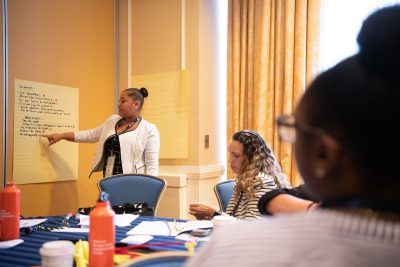Call for Proposals
Innovations Institute welcomes presentation proposals for the 2025 Training Institutes, Building a World Where Young People Thrive, that challenge us to advance research-based, community centered, and transformative solutions to improve outcomes.
Join colleagues from across the country who will present their work in more than 165 innovative, in-depth workshops that address workforce development, systems design and financing, data-driven strategic planning, evidence-based and community centered services, and quality improvement for child/youth and family services including mental health, substance use, public health, juvenile justice, child welfare, education, early childhood, and transition age services.
Submission Details
Innovations Institute welcomes presentation proposals for the 2025 Training Institutes from individuals with expertise in integrating systems and improving outcomes for children, youth, young adults, and their families. This includes experts and leaders in state, county, tribal, and territorial children’s systems; direct service providers; state purchasers and experts from Medicaid and managed care; family and youth leaders; and educators.
Proposal Content & Policies
Required Proposal Content
- Presenter name, email, organization, title, 200-word bio and resume
- Title (full title – 15 words or less)
- Session Type (see list below)
- Focus area (see list on following page of options)
- Three to five action-oriented learning objectives
- Description of Proposed Session (1,000 characters max)
- Learning methods
Presenter Information
The primary presenter should also be the main contact person who will receive correspondence regarding the proposal. Please convey relevant information to all co- presenters.
Policies
- All presenters must be registered participants at the 2025 Training Institutes and are responsible for the full conference registration fee, unless noted otherwise below, as well as for any Pre-Institutes Training Programs they elect to attend.
- Presenters are responsible for their own travel and hotel costs.
- Presenters are eligible to apply for continuing education credits for their participation. Continuing education credits are an additional cost. Please view the conference fee structure on the website: .
Deadline for Submissions
Proposals are due by October 10, 2024, 11:59PM EST. Changes to proposals may be completed online up to the deadline but no changes will be accepted after this date. Incomplete submissions will not be considered.
How to Submit Your Proposal
- Choose the Submit Proposal link to enter your detailed information. Create a profile.
- Enter the primary presenter’s details. Add co-presenters by selecting the Add Co-Presenter button. Up to 5 co-presenters can be added. Select Next.
- Select your presentation type and focus area and information about your content. Select Next.
- Review your information before selecting the Submit button.
- Check your email for receipt confirmation.
- Make edits as often as you wish until October 10, 2024, 11:59PM EST. To make edits, log in to your Call for Proposals Portal (CVent), choose My Submissions, choose Edit Submission, select Next to advance and when done, select Submit. You will need the link in your confirmation email to make edits.
Questions regarding the proposal submission process can be directed to: traininginstitutes@uconn.edu and technical questions about CVent can be directed to innovationshelp@uconn.edu.
Review Criteria
Proposals will be assessed on the following:
- Relevant and innovative approach
- Evidence of impact and positive outcomes
- Financing strategies, if appropriate
- System of care core values of community-based, family-driven, youth-driven, and community centered and responsive designs, models, services, and approaches
- Practical, how-to information on approaches that can be adapted with real-world examples
- Clear learning objectives and approaches designed to engage participants
- Expertise relevant to the topic including meaningful participation of families, youth, and young adults, as appropriate
- Forward-looking discussion around next steps or future challenges and opportunities

Workshop: These 1 1/2-hour sessions include adult learning strategies to enhance participants’ knowledge in a topic area. Information should be operationally relevant, innovative, and replicable. Presenters may include up to four individuals, one of whom can receive a discounted presenter registration.*

Ignite Talk: Five-minute inspirational talks with 20 slides that automatically advance every 15 seconds. Ignite Talks are thought-provoking personal and/or professional stories on hot topics designed to enlighten, inspire, and entertain the audience. If selected, you will receive virtual coaching and support in developing and presenting your talk. The presenters of Ignite Talks will receive one discounted registration.

Poster Presentation: Highlight research findings, new ideas, innovations, and advances in the field in an informal setting. A poster template will be provided to focus on your most important findings with a QR code that participants can scan for more information. Details will be provided for accepted poster presentations. Poster presenters may include up to four individuals.*

Data Points: Ten-minute presentations and accompanying posters that introduce data and show results from new programs, initiatives, or research with slides. Data Points are an opportunity to present a well- organized talk that starts with a clearly defined opportunity for change, introduces relevant data, and presents results or conclusions. Data Points are great vehicle for impactful initiatives that result in improved outcomes for children, youth, young adults, and their families. Practice is key to a successful PowerPitch as your presentation time will end at 10 minutes!
